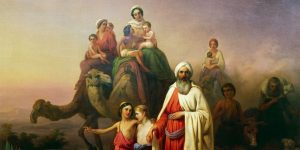
For what does the Scripture say? “Abraham believed God, and it was credited to him as righteousness.” Now to the one who works, his wage is not credited as a favor, but as what is due. But to the one who does not work, but believes in Him who justifies the ungodly, his faith is credited as righteousness. – Romans 4:3-5
Abraham the Travelin’ Man
At one time or other, you may have had occasion to pack up the family and move to another part of the country.![]() That often happens when there is a job change, or for additional schooling. It’s a lot of hard work just to get things packed and loaded into the truck. Then there’s the trip to the new home – lots of emotions, friends left behind, unknown challenges yet ahead. Wears you out just thinking about it, right? Abram and Sarai went through a similar
That often happens when there is a job change, or for additional schooling. It’s a lot of hard work just to get things packed and loaded into the truck. Then there’s the trip to the new home – lots of emotions, friends left behind, unknown challenges yet ahead. Wears you out just thinking about it, right? Abram and Sarai went through a similar  experience, although they weren’t able to rent a U-Haul truck. God called Abram and his family to leave the plush enjoyments of Ur and go to rugged Canaan. They packed up their extended family and as much of their belongings as possible, said goodbye to their beautiful home, and off they went. Six hundred miles and several months later, they arrived in Shechem, in central Canaan, and the real adventure began.
experience, although they weren’t able to rent a U-Haul truck. God called Abram and his family to leave the plush enjoyments of Ur and go to rugged Canaan. They packed up their extended family and as much of their belongings as possible, said goodbye to their beautiful home, and off they went. Six hundred miles and several months later, they arrived in Shechem, in central Canaan, and the real adventure began.
Growing up, Abram may not have realized the kind of life he would experience, but when he obeyed the call of God, his heart engaged with faith in God’s plan. Whether by upbringing with his father Terah, or simply the enabling power of God, Abram came to be a godly and capable leader, straight and strong, ready to hear and obey God’s leading. As we continue to study Genesis, we will learn about the nomadic travels of this great man of God. We also get to see how he wasn’t perfect, and made some poor decisions. His faith in God however did not waver, and God remained his friend and continued to speak with him and guide his paths.
Please pause here and open your Bible and read through Genesis 13-15 in one sitting before you continue on through this Bible Study.

Abraham’s Story
 Abraham was a Man of Faith
Abraham was a Man of Faith
Abraham is a key member of the Bible’s “Hall of Faith” in Hebrews 11 – Hebrews 11:8-19 introduces Abraham as the “Father of the Faithful”, his declared and demonstrated faith in God’s promise is the foundation of our faith in the finished  work of Christ. Romans 4:3-5 establishes that he is our axiomatic point of reference for the great biblical truth of Justification by Faith – “the just shall live by faith!”
work of Christ. Romans 4:3-5 establishes that he is our axiomatic point of reference for the great biblical truth of Justification by Faith – “the just shall live by faith!”
Abraham was a living example of personal communication with God. There are many instances in the Bible where God spoke to Abraham, and there is no indication in the Scripture not to understand that Abraham actually heard God’s voice. Right at the beginning of Abraham’s journey in Gen. 12:1, “God said to Abram…”, and then Gen. 12:4, “as the Lord had spoken”. These very human expressions have no reason not to be interpreted literally. In Gen. 17:1-22 is another major passage of Abraham talking with God. Only in Gen. 17:17 does the Bible say that Abraham said something internally. Here are some more examples where it seems Abraham really heard God’s voice – Gen. 15:5, 7, 8, 13; 17:1, 9. The Bible tells us Abraham was the “Friend of God” – James 2:23; Isa. 41:8; Gen. 18:1-8; Heb. 11:9-19; Gal. 3:7-9; Rom. 4:1-10.
Abraham was human and so he wasn’t perfect. He had human responses to difficulties in his life, sometimes resulting in bad choices. But Abraham’s heart was turned towards God, ready to hear when God spoke; and he always started with agreement. He sometimes faltered in the execution, but he was committed to honoring God in his life. His unflinching faith is shown by facing difficult challenges, such as a very long trip from Ur to Canaan. Then consider his rescue of foolish Lot, Isaac’s sacrifice, events which we will study in coming study sessions.
Abraham led a life of worship & faith, as demonstrated in Gen. 13:4, by his humble worship when he had returned from his foolish sojourn in Egypt. He made difficult choices, such as in Gen. 13:8, where he chose to allow Lot to choose the best land to live in. Abraham attained great victories, such as in Gen. 14:14-15, where he led his army in victory to rescue Lot.
Abraham is a bit of a quandary
- A good man will want to provide for his family, which Abraham did, but sometimes he ran ahead of God and chose to step away from integrity in order to supposedly protect him and his family – Gen. 12:11-13; 20:1-2,5.
- Laughter is good, but it can also slip into weak faith. We all laugh for joy, but sometimes faith isn’t there – Gen. 17:17; 18:10-15.
- We want to take initiative in doing God’s work, but Abram & Sarai disregarded God’s model of man and wife, and missed the point of the miraculous – Gen. 16:1-9; 21:8-13.
- We also want to be nice to the neighbors, but making agreements of obligation and partnership with unbelievers is never right – Gen.20:1-2; 21:22-23.
- The good news according to Jesus… Jn. 8:56, Abraham was a visionary.
Abraham faced a life of obstacles & challenges
- Gen.11:30, Sarai was barren and incapable of producing an heir.
- Gen. 12:10-20, Famine came to Canaan,and although God had told him he would bless him in Canaan, he took his family to Egypt and put himself in danger.
- Gen.13, Abram’s nephew, Lot, strove with him over the land.
- Gen. 14, Abram’s life was in danger of retaliation in the Promised Land. He had entered a war and could have died, or lost all his possessions by warring with the Mesopotamian kings.
- Gen. 14:13, “the Hebrew”, an ethnic reference, this is the first time it is associated with Abram and identifies him as descended from Eber (Gen. 11:15).
- Gen.15:2-3, God ruled Eliezer out as Abram’s heir.
- Gen.16:6; 21:12-14, Hagar, at Sarai’s insistence, bore Abram a son, Ishmael; then when Ishmael was 14, Sarai forced them to leave.
- Gen. 20, Abimelech threatened Sarai’s reputation and child in Gerar, when Abraham had foolishly taken them back down to Egypt again.
- Gen. 21:8-11, Abraham had two heirs, Isaac and Ishmael.
- Gen. 22, God tested Abraham by commanding him to offer Isaac as a sacrifice, thus giving us the Redemptive promises of Substitution and Resurrection.
- Gen. 24:5, Abraham couldn’t find a proper wife for his son Isaac, but God miraculously led his servant Eliezer to find Rebekah.
The Abrahamic Covenant:
Certified and Defended – Gen. 15
Gen. 15:1, great words from God
“After these things…” refers to Gen. 14, where several eastern kings joined together to conquer the nations already in Canaan. They were from places around Babylon and probably wanted to control trade routes to and through the Mediteranean area. The battle occurred in the area south of the Dead Sea, where Sodom & Gomorrah were located. After the conflict, Abraham meets with the king of Sodom and Melchizadek, king of Salem (understood to be the Jerusalem area). Abraham rejects an offer from the wicked king of Sodom, but instead meets and gives an offering to Melchizedek whom he recognizes as both a king and a priest of the One True God (the first priest mentioned in the Bible). This occasion is mentioned in Hebrews in order emphasize the superiority of Jesus as our Great High Priest (Heb. 7:1-7). Abraham received a blessing from Melchizadek, and gave an offering (the first mention of a tithe) to Melchizadek. God required this context of faith from Abraham in order to move forward.
 Gen. 15 , Two encounters between God and His friend Abraham
Gen. 15 , Two encounters between God and His friend Abraham
The First Encounter: The Vision in Gen. 15:1-8
God says “Don’t fear!“ to Abraham, but apparently Abraham is feeling anxious, fearing that something bad may happen. Falling back to a reliance on yourself can take your eyes off of God’s power to apprehension and dread of the unkown. This passage is a major statement of God’s covenant with Abraham, anchored in “Do not be afraid… I am your shield… exceedingly great reward.” God then (Gen. 15:6) finalized Abraham as declared righteousness as a result of faith in this covenant God. God dealt with Abraham’s desire that He would accept his servant Eliezer as the his son . God made it clear that this was not His plan. Eliezer is Abraham’s servant – he may be the servant in Gen 24:2 as well. Later, Abraham would plead with God to accept Ishmael as his son to carry on his name. God knew this Seed Bearer (the Redeemer God promised He would provide for mankind) would need to be the natural seed of Abraham. Abraham considered his age to be a problem and only saw a man-centered solution; God saw otherwise, He showed him the stars as an expression of the expanse of his descendants in God’s plan.
The Second Encounter: The Covenant in Gen. 15:9-21
Abraham asks God for a way to understand the certainty of God’s promise that he will inherit the promised land of Canaan. God volunteered to make a covenant with Abraham and guarantee the promise by Himself. The ritual that occurs here was recognized by various cultures to attest to a covenant between two parties; they would cut the animals down the middle and both parties would walk between them. God’s Guarantee – This time, only God passed through the middle of the animal pieces, he alone was bound to guarantee the accomplishment of the promise. Note that this was not a sacrifice, there is no fire, and no statement of sin being covered. This event is the formal “cutting” or establishment of the Abrahamic Covenant.
God promises Abraham Land, Seed & Blessing – God promised these three major blessings to Abraham, originally stated in Gen. 12:1-3 – this is one of the greatest foundational passages of all Scripture, it even documents God’s definition of the land’s boundaries and lists the ten nations that will be conquered within the boundaries which God describes here – very specific. Gen. 12 begins the Dispensation of Promise and it lasts until the giving of the Law through Moses. The Law didn’t annul God’s Promise here, but superseded it – Ex0. 19:3-8.
Gen. 15:18 is possibly the single greatest statement in the Bible, as God concludes this ratification of his covenant with Abraham. Paul repeats it in Romans 4 in combination with Gen. 15:6 as He declares the great work of God to declare us righteous in Christ.
- What does Hebrews 6:13-15 teach us about this event?
-
-
- Rom. 4:3,9,22; Gal. 3:6; James 2:23 give us the New Testament fulfillment of every believer in Jesus Christ being declared righteous, based on the same faith Abraham had.
-
-
Justification by Faith
- Justification is the core doctrine of our Christian faith
- Anticipated by the Old Testament Law and the sacrifices which provided a temporary “covering” for sin, Paul’s letter to the Romans is the eloquent and complete elaboration of our “once for all” Redemption now delivered by our Great Savior (Heb. 9-10).
- Genesis 15:6, Abraham is declared righteous
- This great verse becomes a critical focal point of the Old Testament and really for all of Scripture. Imputed righteousness (treasure placed into your “account” with no effort of your own) displaces your previous guilty
 condition, permanently establishing you as guilt-free before the Judge, God Himself – Rom. 3 :24-25. This new status (not state or conduct, which is sanctification, our ongoing being made righteous by the Holy Spirit) comes to you by faith alone, Eph. 2:8-9. Abraham was declared righteous in spite of his sin – there was plenty of “exceptions” for Abraham but grace prevailed.
condition, permanently establishing you as guilt-free before the Judge, God Himself – Rom. 3 :24-25. This new status (not state or conduct, which is sanctification, our ongoing being made righteous by the Holy Spirit) comes to you by faith alone, Eph. 2:8-9. Abraham was declared righteous in spite of his sin – there was plenty of “exceptions” for Abraham but grace prevailed.
- See also; Rom.1:17; 4:1-8; 5:13-14; Gal.2:15-16; 3:6-11; Rom. 4:3; James 2:21-24; Heb. 10:38.
- For the OT use – Lev. 7:18; 17:4; Num 18:27; Psa 145:17.
- The Bible makes it clear that Imputed Righteousness (salvation) comes by faith alone in all of the ages of man’s history
- Righteousness – the root meaning is a measuring reed or ruler; so sin is any deviation from the standard of God’s own righteousness. God’s “initiating love” is the requirement for salvation, not human resources – so, declared by God to have “no deviation“.
- Now, On to the Christian Life
- 6:11 – “Reckon” yourselves dead to sin but alive to God! The same understanding of “declaring it to be so” in a final sense of the word.
- This great verse becomes a critical focal point of the Old Testament and really for all of Scripture. Imputed righteousness (treasure placed into your “account” with no effort of your own) displaces your previous guilty
![]() Bible Study Journal
Bible Study Journal
-
-
- What problem did Abraham have with God’s promise in Gen.15:2-3?
- Name two other Bible passages where 15:6 is referred to.
- What specific promise did God make with Abraham in 15:18-21?
- Why did Sarai think she needed to come up with an alternative plan (16:1-2)?
- Who speaks with Hagar in the desert? (16:7-12)
- Why is the meaning of Ishmael’s name important? (16:11-12)
- Find the name of God given in each verse below, note the Hebrew words used and describe what it means about God’s character:
15:2
16:13
17:1
22:14 - How is laughter used in Gen. 17:17 and 18:12, and why does it occur in this account?
-




